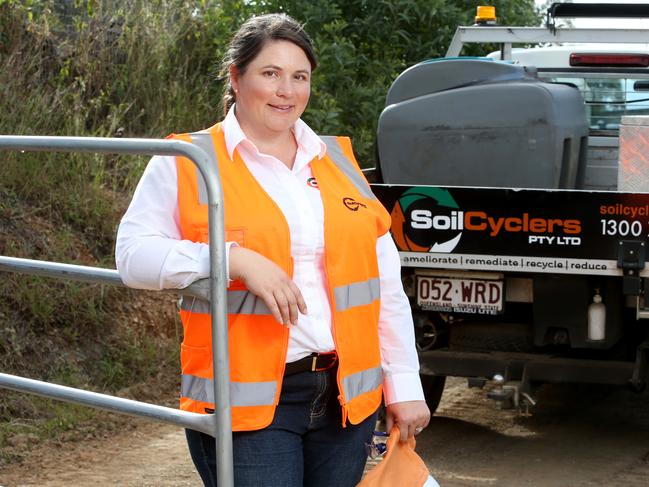How to break down gender barriers in male-dominated careers
A sense of humour can make a big difference for women breaking into male-dominated sectors. But it’s not always that simple.
Careers
Don't miss out on the headlines from Careers. Followed categories will be added to My News.
Women employed in male-dominated industries may face a unique set of challenges but a sense of humour can go a long way to busting down barriers for everyone.
Workplace Gender Equality Agency data shows people still predominantly choose careers along gender lines despite a collective push from educators, employers and governments to improve diversity.
The proportion of women in healthcare and social assistance as well as in education and training has increased over the past 20 years while the proportion in construction and in transport has declined.
Randstad’s 2019 Women in Construction Report suggests issues with workplace culture may be a significant contributing factor.
It finds 37 per cent of females working in the construction industry have experienced inappropriate behaviour from male colleagues, while 38 per cent believe a lack of gender diversity contributes to women leaving or being reluctant to enter the industry.

SEEK resident psychologist Sabina Read says while it is the responsibility of the employer or manager to create a fair and inclusive culture, humour can be a useful tool for women when addressing issues such as a sexist comment.
This applies in both white and blue collar workplaces.
“You might make a joke but also say, ‘I’m not comfortable with that’, or, ‘I know you didn’t mean it in a bad way but it hasn’t landed well with me’,” she says.
“Use humour while directly challenging the statement or assumption.
“Sometimes our default is to ignore it but if we don’t speak up, nothing will change.”
Coast2Coast Projects owner and director Roshae Farquhar says workplace culture has improved a lot during her 20 years in the construction industry, although she experienced issues in the past.
“When I first walked in to do my builder’s course 12 years ago I was the only female in the class and straight away it was, ‘You’ll get the teas and coffees won’t you, love?’,” she says.
“I had to rise above that and six months into the course they were all asking me for work.”

Farquhar, whose shop-fitting company employs four women and three men, agrees a sense of humour is helpful in the workplace.
“Remember to have a laugh,” she says.
“At the end of the day, things can be taken too seriously and get wrapped up in the politics.”
She encourages more women to pursue careers in male-dominated industries, such as construction.
“Women are not feeling confident enough and there are these preconceived ideas we are not equal but not everyone thinks that way,” she says.
“Throw your hat in the ring, speak up, be strong … and let your work speak for itself.
“We are as capable as anyone so be confident and back yourself.”
National Association of Women In Construction (NAWIC) vice chair Alison Price says inappropriate behaviour from male colleagues used to be a weekly occurrence for her but attitudes are changing, making the construction sector a better place for women to work.
MORE NEWS:
What should 2032 SEQ Olympics be called?
Flights cancelled as Jetstar workers strike
What we Googled in the 2010s revealed
How to save a life this Christmas

“People used to think it was OK to make comments about physical appearance or to touch inappropriately, but those instances are few and far between now and the industry at large doesn’t really find that acceptable anymore,” she says.
“There are more and more men who will stand up and call out their co-workers for that sort of thing and the construction industry is somewhere women can build amazing careers these days.”
Price, who is managing director of environmental health service SoilCyclers, says it was daunting to be the only woman in a meeting when she was starting out but “once you are technically capable, you are just another person in the room”.
Her advice for women in male-dominated industries is to find a support network and join dedicated organisations, such as NAWIC.
She also recommends not being “too quick to get angry” about jokes and comments.
“Have a sense of humour, too,” she says.
“Some of the best relationships I have in the industry are based on a sense of humour rather than talking about the football score.
“I am not really interested in football but everyone is interested in having a joke.”
Price encourages young women to take advantage of the good salaries on offer in the construction industry.
“I don’t know why we send only boys into trades,” she says.
“I would love to see some of our school girls get into construction.”
READ MORE EMPLOYMENT NEWS IN THE CAREERS SECTION OF SATURDAY’S THE COURIER-MAIL, THE ADVERTISER, THE HERALD SUN AND THE DAILY TELEGRAPH.


